Dartmouth scores well with MCAS results
 Percentage of state vs. Dartmouth ELA scores meeting/exceeding expectations.
Percentage of state vs. Dartmouth ELA scores meeting/exceeding expectations.  Dartmouth math scores Pre-Covid vs. 2025
Dartmouth math scores Pre-Covid vs. 2025 Dartmouth science scores Pre-Covid vs. 2025
Dartmouth science scores Pre-Covid vs. 2025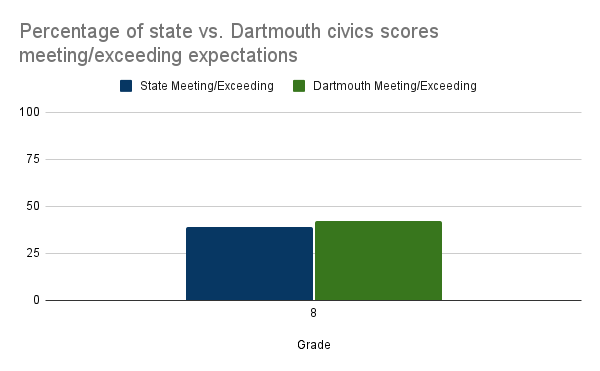 Percentage of state vs. Dartmouth science scores meeting/exceeding expectations.
Percentage of state vs. Dartmouth science scores meeting/exceeding expectations.  Dartmouth ELA scores Pre-Covid vs. 2025. Graphs by Kat Sheridan
Dartmouth ELA scores Pre-Covid vs. 2025. Graphs by Kat Sheridan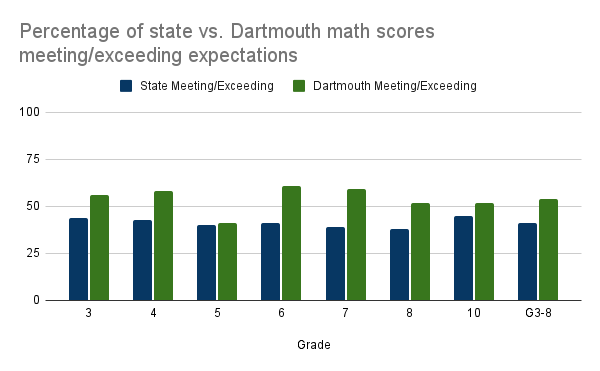 Percentage of state vs. Dartmouth math scores meeting/exceeding expectations.
Percentage of state vs. Dartmouth math scores meeting/exceeding expectations.  Percentage of state vs. Dartmouth science scores meeting/exceeding expectations.
Percentage of state vs. Dartmouth science scores meeting/exceeding expectations.  Percentage of state vs. Dartmouth ELA scores meeting/exceeding expectations.
Percentage of state vs. Dartmouth ELA scores meeting/exceeding expectations. 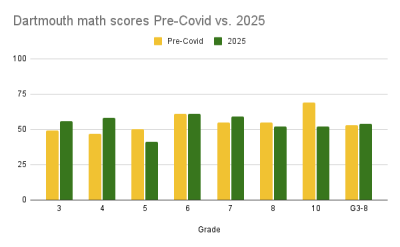 Dartmouth math scores Pre-Covid vs. 2025
Dartmouth math scores Pre-Covid vs. 2025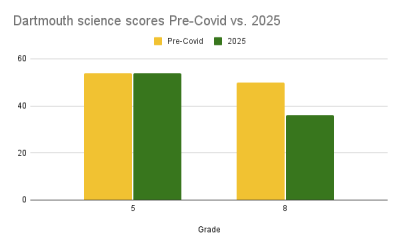 Dartmouth science scores Pre-Covid vs. 2025
Dartmouth science scores Pre-Covid vs. 2025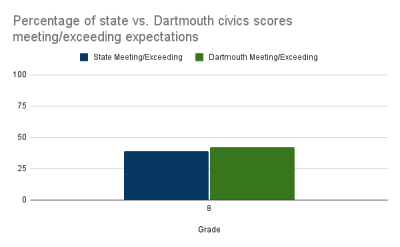 Percentage of state vs. Dartmouth science scores meeting/exceeding expectations.
Percentage of state vs. Dartmouth science scores meeting/exceeding expectations. 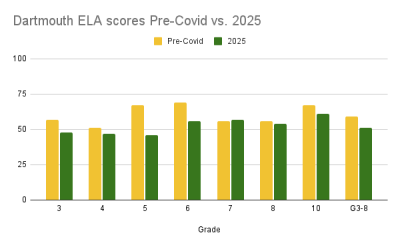 Dartmouth ELA scores Pre-Covid vs. 2025. Graphs by Kat Sheridan
Dartmouth ELA scores Pre-Covid vs. 2025. Graphs by Kat Sheridan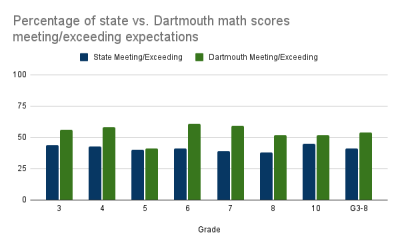 Percentage of state vs. Dartmouth math scores meeting/exceeding expectations.
Percentage of state vs. Dartmouth math scores meeting/exceeding expectations. 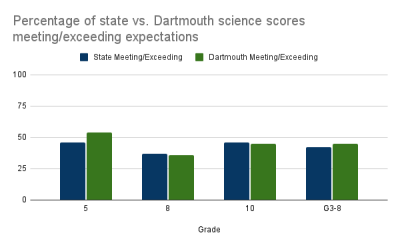 Percentage of state vs. Dartmouth science scores meeting/exceeding expectations.
Percentage of state vs. Dartmouth science scores meeting/exceeding expectations. The 2025 MCAS results are in and Dartmouth Public Schools performed better than average.
Dartmouth did better than the average in the English Language Arts (ELA), math and the new civics sections, but slightly below average in the science section.
“We wanted to take a minute again to applaud certainly our students but our faculty and admin teams who have done such great work,” said Superintendent June Saba-Maguire.
The goal of the Massachusetts Department of Elementary and Secondary Education is to return students to learning levels equal to or better than pre-covid levels. Overall, 55% of Massachusetts schools made substantial progress toward this goal, with 63 out of 396 districts meeting or exceeding 2019 levels.
“We’re excited to be recognized as one of 63 districts that have returned to pre-pandemic levels,” said Saba-Maguire. “And next year it will be our goal to exceed that in ELA and mathematics.”
Dartmouth public schools made moderate progress toward this goal, with substantial and moderate progress in the elementary and middle schools, and no change on the 10th grade level.
In grades three through eight, the students did better in math than pre-pandemic levels with 54% of students exceeding or meeting test expectations compared to 53% in 2019.
While Dartmouth students didn’t surpass all 2019 scores, generally there was an improvement since 2024.
Dartmouth schools won’t require state intervention because the test scores were satisfactory.
A civics section was new this year, which was only taken by eighth graders. There were two components to this, a state-level performance task that covers one of seven topics 2018 history and framework, and an end-of-course test that covers everything within eighth grade civic standards .
The Healy-Driscoll administration wants to address the fact there are a lot of student absences and early literacy improvement that could be causing scores lower than before the pandemic.
Schools and the administration have proposed the Literacy Launch program, which would focus on improving literacy from age 3 to grade three using coaching and systems of support.
This program has $15 million in the current fiscal budget from legislature funding, $25 billion for no-cost literacy tutoring with a priority on first graders.
“We know our educators and students can do great things when all students are welcomed to school and attend classes every day,” said Education Secretary Patrick Tutwiler, “The state’s investment in early literacy will build a solid start for future academic success.”
This is the first year that the MCAS tests are not a graduation requirement, instead using only class scores to decide whether students understand the material. Students are still required to take the exam.
According to Saba-Maguire, there is a downward trend in high schools across the state. It is early to tell whether the impact is because of the lack of graduation requirement.
“I think it's almost too early to say anything, but we can’t ignore it,” Saba-Maguire said , “What we heard from the commissioner today was that there does appear to be an impact on student achievement results at the tenth grade level in particular.”
The school committee will be giving a more in-depth analysis of the results in early November. The school received the results on Friday, Sept. 26 and is still analyzing the test scores.
“It’s our goal, of course, not only to return to pre-pandemic levels of achievement but to actually surpass pre-pandemic levels of achievement and we certainly look forward to being able to be one of the districts next year that have returned to pre-pandemic levels of student achievement in English language arts,” said Saba-Maguire.









































